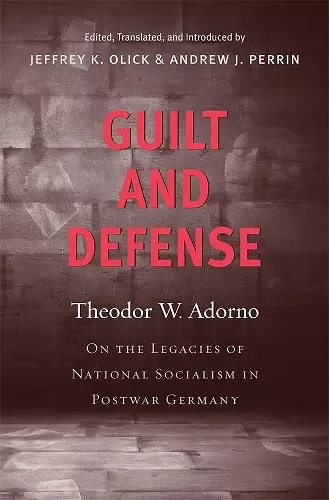Guilt and Defense
On the Legacies of National Socialism in Postwar Germany
Theodor W Adorno author Jeffrey K Olick editor Andrew J Perrin editor
Format:Hardback
Publisher:Harvard University Press
Published:15th Jul '10
Currently unavailable, and unfortunately no date known when it will be back

Beginning in 1949, Theodor W. Adorno and other members of the reconstituted Frankfurt Institute for Social Research undertook a massive empirical study of German opinions about the legacies of the Nazis, applying and modifying techniques they had learned during their U.S. exile. They published their results in 1955 as a research monograph edited by Friedrich Pollock. The study's qualitative results are published here for the first time in English as Guilt and Defense, a psychoanalytically informed analysis of the rhetorical and conceptual mechanisms with which postwar Germans most often denied responsibility for the Nazi past. In their editorial introduction, Jeffrey K. Olick and Andrew J. Perrin show how Adorno’s famous 1959 essay “The Meaning of Working through the Past,” is comprehensible only as a conclusion to his long-standing research and as a reaction to the debate it stirred; this volume also includes a critique by psychologist Peter R. Hoffstater as well as Adorno’s rejoinder. This previously little-known debate provides important new perspectives on postwar German political culture, on the dynamics of collective memory, and on Adorno’s intellectual legacies, which have contributed more to empirical social research than has been acknowledged. A companion volume, Group Experiment and Other Writings, will present the first book-length English translation of the Frankfurt Group's conceptual, methodological, and theoretical innovations in public opinion research.
I am thrilled that Theodor Adorno's Guilt and Defense: On the Legacies of National Socialism in Postwar Germany has eventually been translated and published in a fine American edition. This book documents Adorno's qualitative interpretations of group discussions that were conducted by the Institute of Social Research in Frankfurt and entailed different strata of German society short after WWII and the Holocaust. Here you can read and learn about what average Germans thought in the late 1940s, and how Adorno reconstructed their ideas. This is the best insight into immediate post-War Germany you will ever get. Anyone interested in post-War German politics and culture needs to take a close look at this. Maybe nothing for the beach, either. But for any intellectual interested in 20th century Germany: Indispensable. -- Lars Rensmann * Princeton University Press blog *
ISBN: 9780674036031
Dimensions: unknown
Weight: unknown
256 pages